Shoulder health is vital not only for everyday life but also for fitness and sports. Neglecting your shoulders can lead to pain, stiffness, and even injuries that can limit your range of motion and affect your quality of life. Thankfully, there are effective and simple shoulder health exercises designed to prevent shoulder injuries and improve mobility and strength. Remember, taking care of your shoulders is a great investment in your overall health and well-being, allowing you to perform at your best in all areas of life.
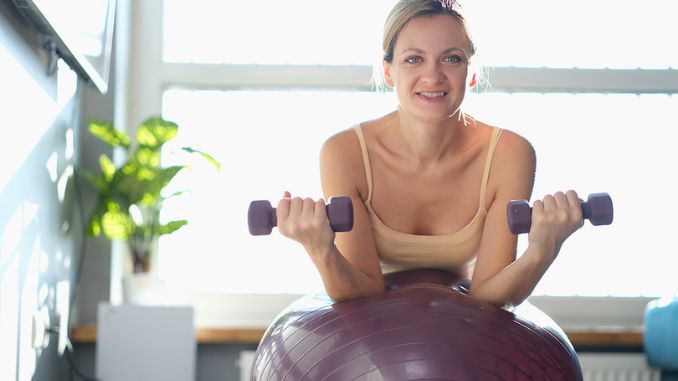
Exercises for Healthy Shoulders
Muscle tension due to a sedentary lifestyle or working at your desk affects some areas of the shoulders, including the rotator cuffs. Taking time to move your shoulder joints can help decrease the strain in this area. Most of the following exercises are timed to ensure you are not overworking your muscles and that the workout is challenging enough to produce results.
1. Standing Arms Swings
Begin in an upright standing position with your feet shoulder-width apart, maintaining good alignment with your head, shoulders, and hips. Engage your core. Lift your arms overhead, forming a Y-shape with your palms facing inward and keeping your shoulders level. Hold this position for 2-3 seconds, then lower your arms down to your sides with your palms facing outwards. Repeat the movement. Start with 1 set of 5 repetitions.
Improve shoulder mobility and relieve tension
When you stand tall, the swinging motion of the arms helps to activate the muscles in the shoulders and upper back, which helps to improve mobility and relieve tension. These shoulder health exercises also help to improve the internal rotation of the shoulders, which can help to reduce inflammation and pain.
The exercise can be a simple yet effective way to improve mobility and relieve tension.
Be careful not to swing too forcefully, which can lead to injury.
Do Standing Arm Swings with Chores
If you’re not into exercising, below are some daily chores and activities to consider involving swinging your arms up and down while maintaining a straight spine. Here are some examples:
a. Gardening for Exercise
Activities like chopping, hoeing, shoveling, and raking
b. Kitchen Chores
Movements like washing the dishes and cleaning countertops
c. Cleaning
Activities such as wiping down surfaces
d. Playing Sports
Several sports require swinging your arms, such as basketball, tennis, baseball, and cricket.
e. Playing Musical Instruments
Several instruments, such as the drums and violin, require you to swing your arms up and down.
f. Swimming
Freestyle, breaststroke, and butterfly strokes all involve swinging your arms up and down in a synchronized motion.
2. Shoulders Up and Over
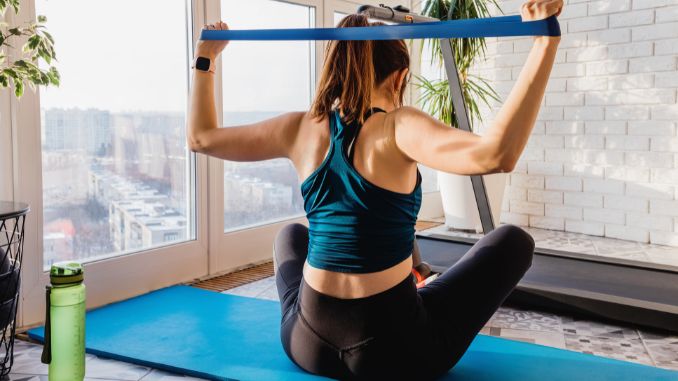
For this exercise, use a mini band, towel, mop, or any long object you can firmly hold.
Begin in an upright standing position with your feet hip-width apart, maintaining good alignment with your head, shoulders, and hips. Hold the ends of the mini band with each hand. Tighten your abdominal area and pull the band apart to create resistance. Lift your arms up and over the back of your head, stretching back as comfortably as possible. Hold this position for a couple of seconds. Return to the starting position and repeat the movement. Start with 1 set of 5 repetitions, then take a 5-10 seconds break.
If your shoulder mobility allows, perform more repetitions.
Remember: If you feel any pain, stop and move on to the next exercise.
Do Shoulder Up and Overs with Chores
The main focus of this workout is to work on the middle section of the shoulder muscles, known as the lateral deltoids. These muscles play a crucial role in raising the arms away from the body and in up-and-down arm movements.
Several daily activities that involve the use of these muscles include:
a. Lifting Bags
When carrying bags, the lateral deltoids are activated to lift the weight away from the body.
b. Doing Lateral Raises
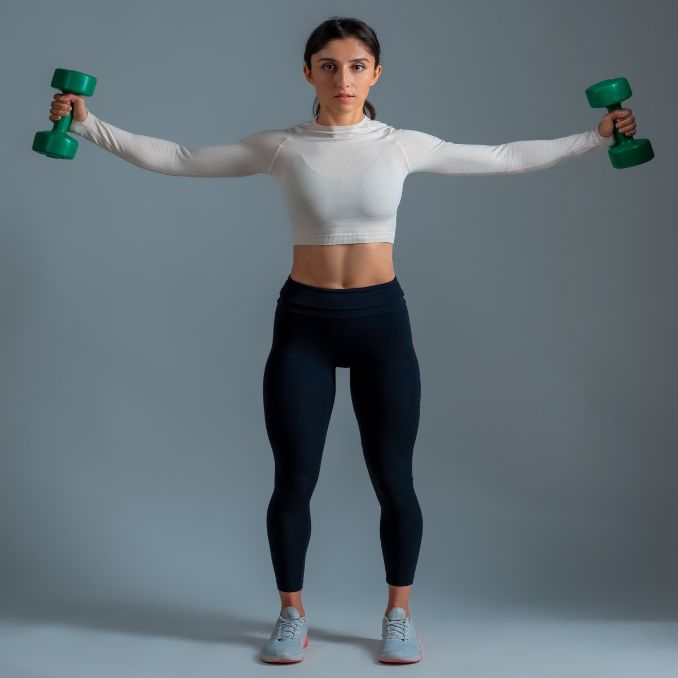
This exercise specifically targets the lateral deltoid muscles.
Begin in an upright standing position with your feet shoulder-width apart, maintaining good alignment with your head, shoulders, hips, and legs. Hold a dumbbell in each hand. Contract your core and raise your arms out at your sides, up to shoulder height. Hold this position for a couple of seconds. Lower your arms back to the starting position and repeat the movement.
It’s important to keep your core engaged to prevent arching of the lower back and ensure a comfortable wrist position to avoid any injuries or overextension.
Keeping your arms at shoulder height is also essential to maximize the benefits of this exercise.
c. Carrying a Backpack or Bag
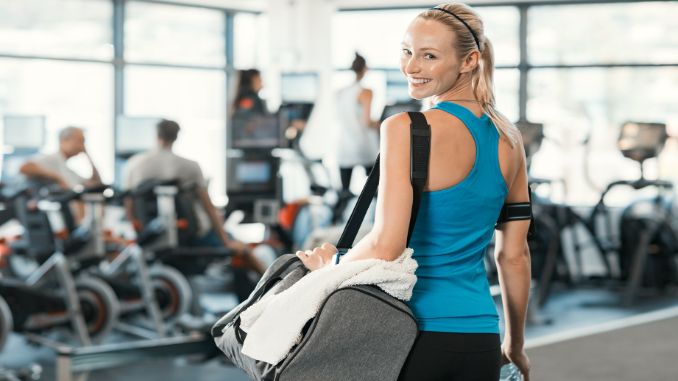
When carrying a bag on one shoulder, the lateral deltoid on that side is activated to lift the weight.
d. Lifting a Roll-Up Door Open
When lifting a heavy roll-up door with one hand, the lateral deltoid on that side is activated to lift the door’s weight.
e. Holding a Baby
When holding a baby, the lateral deltoid is activated to lift the baby’s weight away from the body.
f. Holding a Phone

Holding a phone to your ear engages your lateral deltoids, especially if you’re holding it for an extended period of time.
g. Pushing a Lawnmower
Pushing a lawnmower engages many muscle groups, including the lateral deltoids.
h. Scrubbing Floors
Scrubbing floors or other surfaces involve using your arm to move a brush or scrubber back and forth, which can engage your lateral deltoids.
Benefits
The deltoid muscles are often used in shoulder health exercises that can help strengthen the upper back muscles and improve posture. The lateral, rear, and anterior deltoid muscles play a key role in stabilizing the shoulders, which in turn can result in the following:
1. Better Posture
Exercise can help to improve posture by strengthening the upper back muscles that are responsible for holding the shoulder blades in place and maintaining the correct spine position.
2. Stronger Shoulder Muscles
Exercises target the muscles in the shoulders, including the deltoids and trapezius. Strengthening these muscles can help to improve stability and reduce the risk of injury.
3. Less Neck Tension
Moving your shoulders up and down can help reduce neck and upper back tension. This tension is often caused by poor posture or stress and can lead to headaches and neck pain.
4. Increase in Range of Motion

Exercise can also help to improve the range of motion in the shoulders. Athletes or individuals who perform activities that require a lot of shoulder movement particularly benefit from this routine.
3. Single Arm Rotations
For this exercise, use a 2-pound dumbbell or any lightweight household object.
Begin in an upright standing position with your feet shoulder-width apart, maintaining good alignment with your head, shoulders, and hips. Hold a dumbbell in one hand, then raise your arm to shoulder height with your elbow bent at a 90-degree angle. Engage your core and set your shoulders back. Pivot through your elbow to lower the dumbbell to parallel the floor. Return to the starting position and repeat the movement. After several repetitions, repeat the movement on the opposite side. Start with 1 set of 5 repetitions on each side.
How Single Arm Rotations Help
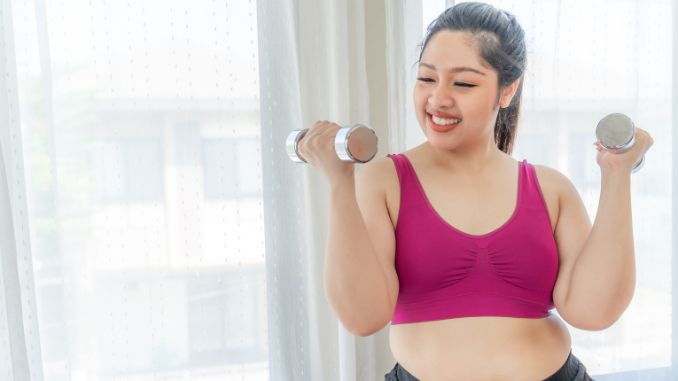
Our shoulders are incredibly complex joints that allow us to perform a wide range of movements, from lifting and reaching, to throwing and pushing. However, due to the complexity of the shoulder joint, it is also one of the most vulnerable areas of the body when it comes to injuries. This is where single-arm rotation exercises come in handy!
By performing single-arm rotation exercises, you can improve the health of your shoulders by strengthening the rotator cuff muscles, which play a crucial role in stabilizing the shoulder joints. These muscles help keep the ball of the shoulder joint in the socket, which is essential for maintaining a healthy shoulder and preventing injuries.
Do Arm Rotation with Chores
Several daily activities and chores involve the movement of the arms up and down parallel to the ground. Some common ones include:
a. Cooking
Preparing meals in the kitchen often requires repetitive motions of the arms, such as chopping vegetables, stirring sauces, or whisking eggs.
b. Cleaning
Chores such as mopping the floor, wiping countertops, and dusting surfaces typically involve moving the arms up and down parallel to the ground.
c. Gardening
Activities like pruning plants and digging holes require arm movements parallel to the ground.
d. Laundry
Hanging clothes on a clothesline or folding them on a table requires repetitive arm movements parallel to the ground.
e. Painting or DIY Projects

If you enjoy painting or doing DIY projects around the house, you are likely familiar with the arm movements involved in tasks like painting walls and ceilings or sanding wood.
Here are some advantages of single-arm rotation exercises:
1. Increased Mobility
Single-arm rotation requires a range of motion of the shoulder joint that helps to improve mobility. Increasing mobility makes it easier to perform other shoulder health exercises and movements requiring shoulder movement.
2. Builds Shoulder Stability
The muscles surrounding the shoulder joint are activated and strengthened by rotating the arm with resistance. This, in turn, helps to improve shoulder stability, making it less prone to injury during physical activities.
3. Prevents Shoulder Injuries
Exercise can help prevent shoulder problems by improving shoulder mobility and stability. A lack of mobility or stability can lead to injuries, so performing these shoulder health exercises can help prevent them.
4. Improved Blood Flow
Shoulder rotation is a simple exercise that involves moving the shoulders in a circular motion. This exercise can help improve blood circulation to the arms and hands by increasing blood circulation through the shoulder joint. You stretch the muscles in your chest and back when you rotate your shoulders. This stretching action helps to increase blood flow to the surrounding tissues and muscles. As a result, the oxygen and nutrients in the blood can reach your arms and hands more efficiently.
5. Improved Posture
Single-arm rotation can also help to improve posture by strengthening the muscles that help support the shoulder blades. Proper posture can help to prevent pain and injury in the shoulders and upper back.
For example, if a person has a desk job and sits for long hours, this person may experience poor posture and shoulder pain. Performing single-arm rotation can help to strengthen the muscles that support the shoulder blades, leading to improved posture and less pain.
4. Banded One Arm Row
For this exercise, use a mini band.
Begin in a standing position with your feet hip-width apart, maintaining good alignment with your head, shoulders, and hips. Step forward with one foot and wrap one end of the band under your front foot while holding the other end of the band in one hand. Hinge through your hips to bend your upper body forward. Engage your core and pull your arm back in a rowing motion, keeping your elbow 30 to 45 degrees away from your body. Lower your arm to the starting position and repeat the movement. Start with 10 repetitions on each side.
The primary muscles targeted when performing a Banded One Arm Row are the rhomboids, middle and lower trapezius, and especially the rear deltoids. These muscles are responsible for pulling your shoulder blades together and down, which helps you maintain good posture. By strengthening these muscles, you can prevent slouching, rounded shoulders, and neck pain caused by poor posture.
Remember: If this exercise exacerbates any existing condition, stop. Consider consulting with your healthcare professional or a physical therapist to understand the issue better.
Do Banded Arm Row with Chores
If you are unable to perform single-arm rows due to injury or other physical limitations, here are some alternative daily chores that work for similar muscle groups:
1. Carrying Groceries
When carrying groceries, hold the bags on one side and engage your back muscles to maintain balance and stability.
2. Vacuuming
Pushing and pulling a vacuum requires you to engage your back muscles and can be a great substitute for single-arm rows.
3. Raking Leaves
Raking leaves involves pulling and lifting motions to help work your back and arms.
4. Shoveling Snow
Shoveling snow requires similar pulling and lifting motions as raking leaves and can be an effective alternative exercise.
5. Carrying a Heavy Bag
If you have a heavy bag or backpack, try carrying it on one side to challenge your back muscles.
Benefits
Banded One Arm Row targets the muscles of your upper body, particularly your shoulders, chest, and arms.
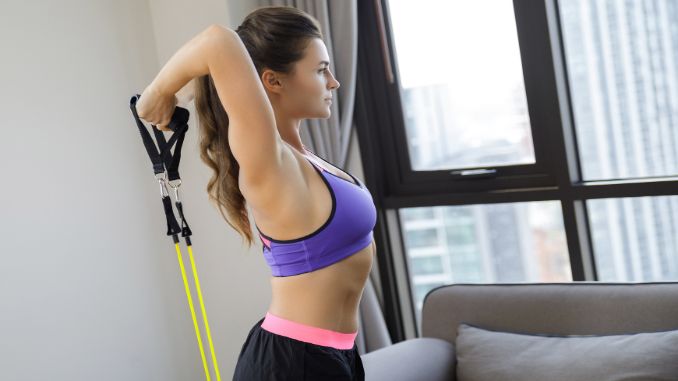
This type of resistance training provides a wide range of benefits that can help you get stronger, leaner, and more toned.
1. Increased Muscle Activation
As you pull the band, your muscles must contract and work against the band’s resistance. This stimulates muscle growth and promotes strength gains.
2. Increased Metabolism
Helps to create muscle tension and generate a greater metabolic response, which can lead to increased calorie burning and fat loss.
3. Improved Posture and Shoulder Stability.
The pulling motion helps to strengthen the muscles of your upper back, which can help prevent hunched shoulders and desk posture. This can also reduce the risk of shoulder and neck injuries and improve your overall athletic performance.
Final Thoughts
A shoulder conditioning program such as these exercises for healthy shoulders is essential in achieving robust shoulders. It is highly recommended for individuals who have experienced shoulder injuries or want to prevent shoulder problems from occurring in the future.
To keep your shoulders healthy and avoid pain and injury, it is important to perform these shoulder health exercises regularly. In case of any shoulder-related problems, it is recommended to focus on the affected shoulder to restore its strength and mobility.
The shoulder exercises mentioned above are simple yet effective shoulder mobility exercises that can help reduce tension and increase strength. Additionally, incorporating activities such as playing musical instruments, cooking, gardening, cleaning, and other household chores can help maintain healthy shoulders.
Taking care of your shoulders is an investment in your overall health and well-being. You can achieve optimal shoulder health with character, commitment, and the right exercises. Incorporating these shoulder health exercises into your routine can help you achieve your utmost potential in every aspect of your life. Remember to start slowly and stop if you experience any pain. If you feel shoulder pain while performing the exercises, talk to your physical therapist or a healthcare professional immediately to determine the underlying cause.









